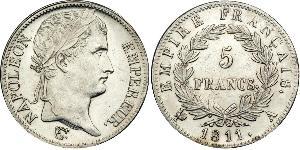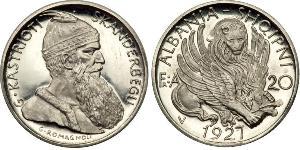20 Franc (sold for $435.0)
1815, France (100 Days Issue!), Napoleon I. Rare Gold 20 Francs Coin. 6.36gm! Struck during his brief rule after his escape from Elba!
Mint year: 1815 Mint Place: Paris (A) Engravers: Brenet & Tiolier ("Tr.") References: Friedberg 523, KM-705.1. R! Denomination: 20 Francs - struck during the last phase of Napoleon´s reign (after his return from exile), which lasted only 100 days! Condition: Numerous circulation-marks, otherwise a nice VF! Material: Gold (.900) .1867 oz ASW Diameter: 21mm Weight: 6.36gm
Obverse: Laureate bust of Napoleon Bonaparté right. Engraver´s signature ("Tr" for Brenet & Tiolier) below. Legend: NAPOLEON EMPEREUR.
Reverse: Denomination (20 Francs) within wreath, date below. Legend: EMPIRE FRANCAIS. (privy mark: cockerel) 1815. (A)
For your consideration a rare gold coin and a true artifact from the famed 100 Days period which is marked by Napoleon's return from exile to the second restoration of King Louis XVIII. A historically important coin and a great addition!
Chafing in exile on the small island of Elba off the Tuscan coast, Napoleon escaped to the southern coast of France and marched swiftly on Paris, winning over forces sent to arrest him by restored Bourbon King Louis XVIII. Napoleon strove mightily to recreate a French Army to counter the advancing Allies, but the men he needed lay dead from Russia to the Rhine. The Emperor threw what men he could gather against his enemies before suffering final defeat at Waterloo and perpetual banishment on the South Atlantic island of Saint Helena. Enshrined forever in romantic legend as the Hundred Days, his resurrected Empire only lasted from March 20 to June 22, 1815.
Napoleon Bonaparte (15 August 1769 – 5 May 1821) was a French military and political leader who had a significant impact on the history of Europe. He was a general during the French Revolution, the ruler of France as First Consul of the French Republic and Emperor of the First French Empire.
Born in Corsica and trained as an artillery officer in mainland France, he rose to prominence during the French Revolution and led successful campaigns against the First and Second Coalitions arrayed against France. In 1799, Napoleon staged a coup d'état and installed himself as First Consul; five years later he crowned himself Emperor of the French. In the first decade of the nineteenth century, he turned the armies of France against every major European power and dominated continental Europe through a series of military victories - epitomised in battles such as Austerlitz and Friedland. He maintained France's sphere of influence by the formation of extensive alliances and the appointment of friends and family members to rule other European countries as French client states.
The French invasion of Russia in 1812 marked a turning point in Napoleon's fortunes. His Grande Armée was wrecked in the campaign and never fully recovered. In 1813, the Sixth Coalition defeated his forces at Leipzig, invaded France and exiled him to the island of Elba. Less than a year later, he returned and was finally defeated at the Battle of Waterloo in June 1815. Napoleon spent the last six years of his life under British supervision on the island of Saint Helena, where he died in 1821. The autopsy concluded he died of stomach cancer though Sten Forshufvud and other scientists in the 1960s conjectured that he had been poisoned with arsenic.
Napoleon developed few military innovations, drew his tactics from different sources and scored major victories with a modernised French army. His campaigns are studied at military academies the world over and he is widely regarded as one of history's greatest commanders. While considered a tyrant by his opponents, he is remembered for the establishment of the Napoleonic code, which laid the administrative foundations for much of Western Europe.
The Hundred Days (French: les Cent-Jours) marked the period between Napoleon's return from exile on the island of Elba to Paris on 20 March 1815 and the second restoration of King Louis XVIII on 8 July 1815 (a period of 110 days). This period saw the War of the Seventh Coalition, and includes the Waterloo Campaign, the Neapolitan War as well as several other minor campaigns. The phrase les Cent Jours (the hundred days) was first used by the prefect of Paris, Gaspard, comte de Chabrol, in his speech welcoming the king back to Paris on 8 July.
Napoleon returned while the Congress of Vienna was sitting. On 13 March, seven days before Napoleon reached Paris, the powers at the Congress of Vienna declared him an outlaw, and on 25 March Austria, Prussia, Russia and the United Kingdom, members of the Seventh Coalition, bound themselves to put 150,000 men each into the field to end his rule. This set the stage for the last conflict in the Napoleonic Wars, the defeat of Napoleon at the Battle of Waterloo, the restoration of the French monarchy for the second time and the permanent exile of Napoleon to the distant island of Saint Helena, where he died in May 1821.
Only 1$ shipping for each additional coin purchased!

|
Posted by:
anonymous 2018-02-20 |
|
||
|
||
|
||
|
||
|
||
2 Florin / 2 Gulden Austria-Hungary (1867-1918) Silver Franz ...
group has 19 coins / 18 prices
⇑

-600-300-NSsKqUpYYMMAAAFhhtqs77HN.jpg)

-300-150-KJrBwcI0IfYAAAEqojooKi4Y.jpg)
 Deutsch
Deutsch Русский
Русский Українська
Українська English
English Italiano
Italiano Français
Français Español
Español 汉语
汉语






-300-150-KgQKX9ISLlMAAAFYVIy668M0.jpg)






